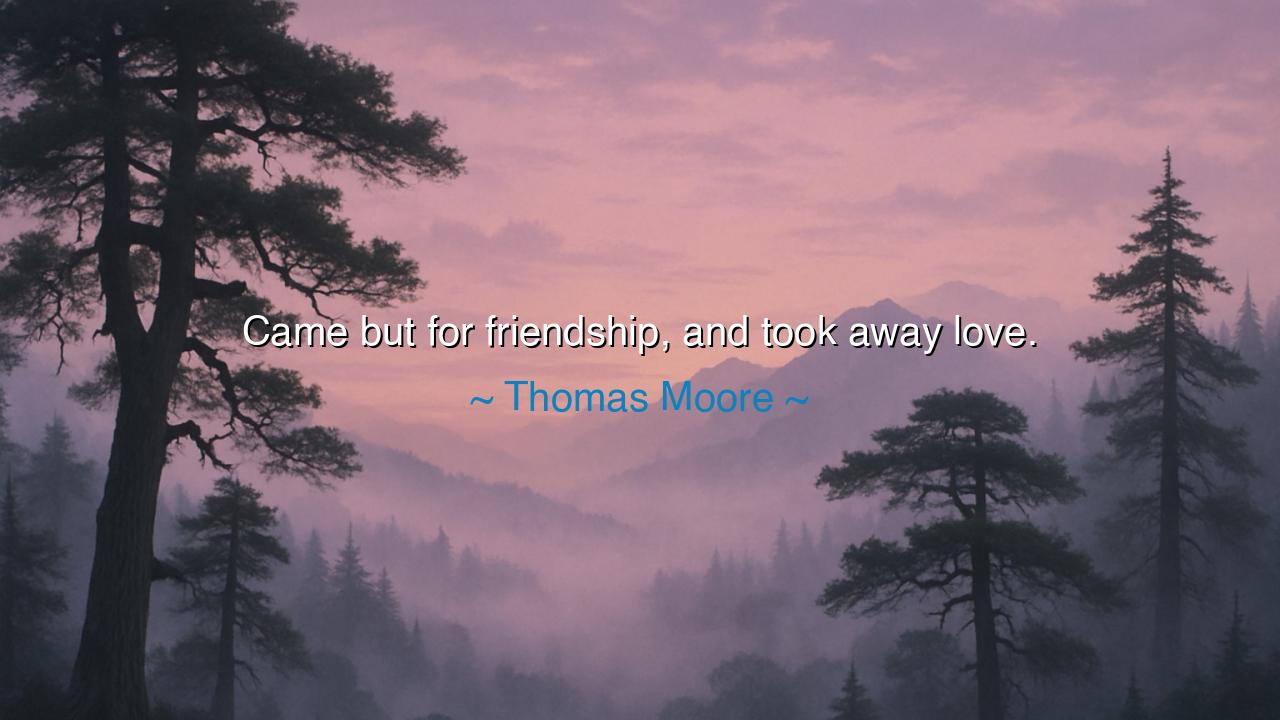
Came but for friendship, and took away love.






"Came but for friendship, and took away love." These poignant words by Thomas Moore speak to the deep and mysterious nature of human relationships, where intentions and outcomes can sometimes become intertwined in ways that neither party can predict or control. Moore encapsulates a timeless truth: that friendship and love often enter our lives through different doors, yet may merge in unexpected ways. One may seek friendship, an innocent desire for companionship and camaraderie, only to find that love, in all its complexity and depth, slips in unnoticed, capturing the heart. This blending of friendship and love is not merely a romantic turn of events, but a reflection of the transformative power that relationships can have, shaping us in ways we may not fully understand.
In the ancient world, the concept of friendship and love was often intertwined. Plato, in his Symposium, described love as a force that transcends physical attraction, one that can evolve from the admiration of a person’s soul and virtues into a deeper connection that elevates both parties. The philosopher saw love as a path to wisdom, not simply an emotional entanglement, but a force that compels individuals to seek a higher good. For Plato, the love that emerged from friendship was not incidental, but an inherent part of the human condition, an expression of the soul's longing for truth and beauty. Moore's quote echoes this ancient truth: friendship is the gateway through which love may enter, often when we least expect it.
The tale of Achilles and Patroclus from the Iliad offers a profound example of how friendship can evolve into love in the most unexpected ways. Achilles, the greatest of the Greek warriors, and Patroclus, his dearest companion, shared a bond that transcended the traditional understanding of friendship. Their relationship, though rooted in brotherhood and shared struggles, was also one of profound devotion. When Patroclus fell in battle, it was not just the loss of a friend that struck Achilles, but the devastating realization of the love he held for Patroclus—a love that was not fully understood until it was too late. In their story, we see that friendship, born out of shared experiences and mutual respect, can often evolve into a much deeper, more powerful bond—one that is akin to love. The tragic beauty of their relationship lies in this transformation, where love took hold unexpectedly, transforming the grief of Achilles into a force that would shape the course of the war and his very life.
Similarly, the relationship between David and Jonathan in the Bible offers another illustration of how friendship and love can become intertwined in the most profound ways. Jonathan, the son of King Saul, and David, the future king of Israel, shared a bond that was celebrated not just for its strength but for its depth. Their friendship was one of unwavering loyalty, but it was also marked by an emotional and spiritual connection that some have interpreted as a form of love. Jonathan and David were not simply companions; they were bound by a shared sense of purpose, a mutual commitment to one another’s well-being that transcended mere friendship. In their friendship, love found its way, not as a sudden surge of romantic passion, but as an enduring force that held them together in the face of political intrigue and personal sacrifice.
Moore’s words remind us of the power and mystery of human relationships. While one might initially seek friendship for the simple reasons of companionship, trust, and support, it is often in the most unexpected moments that love enters the picture. This is not always a romantic love, but a deeper bond that transcends friendship’s boundaries. Love can be transformative, shifting from a familiar and comfortable affection to something far more intimate and profound. In many ways, this speaks to the deeper dynamics of all relationships: the potential for unexpected change, for growth and evolution, and the ever-present possibility of discovering new facets of connection that were previously unseen.
The lesson we draw from Thomas Moore is one of openness and vulnerability. When we form relationships, whether they are born of friendship or happenstance, we must remain open to the possibility that what begins as one thing may transform into something entirely different. Friendship is a beautiful gift, but we must recognize that it can often lead us to deeper connections and emotional experiences than we first imagined. Rather than fearing the unknown or resisting the evolution of a bond, we should embrace the fluid nature of relationships and allow them to unfold in ways that honor both our initial intentions and the depths of feeling that may emerge.
In our own lives, we must ask ourselves: Are we open to the possibility that the friendships we build might become something far deeper? Are we willing to let love grow from friendship, even when it is unexpected? The beauty of Moore’s quote lies in the reminder that love is not always a deliberate force, but one that can be nurtured, sometimes unknowingly, through the simple act of building connections with others. Whether in friendship or in love, it is the willingness to give of ourselves, to remain vulnerable, and to honor the evolving nature of our relationships that leads us to the deepest, most meaningful bonds.
Let us then walk through life with open hearts and minds, ready to form friendships that may surprise us with their depth. In doing so, we open ourselves to the possibility of love, in all its forms, which might come into our lives not as a sudden event but as a quiet, transformative force that grows from the seeds of trust, companionship, and mutual respect. In this, we find that the journey of building a relationship is not always about what we seek, but about being open to what may emerge along the way.






AAdministratorAdministrator
Welcome, honored guests. Please leave a comment, we will respond soon